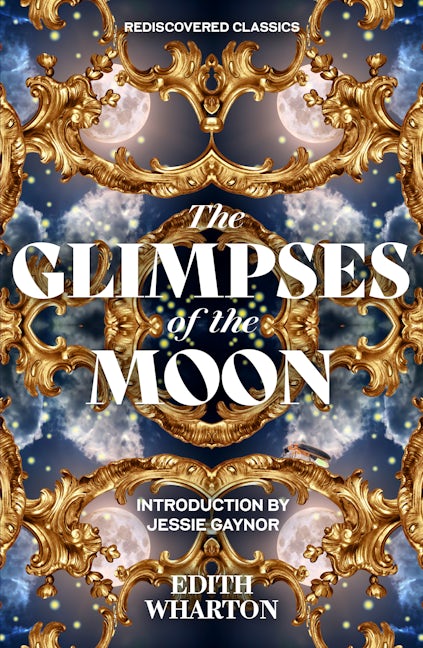The Pleasures of a Pessimistic Literary Escape: Jessie Gaynor on Edith Wharton’s The Glimpses of the Moon
"Even when writing an escapist romance, Wharton is inescapably herself"
As I read The Glimpses of the Moon, I couldn’t help but think about the place of its heroine, Susy Lansing, in the Edith Wharton Extended Universe. Like most of Wharton’s female protagonists, she is beautiful, though her beauty is mentioned only in passing. Her soon-to-be-estranged husband Nick Lansing reflects that
Apart from the pleasure of looking at her and listening to her—of enjoying in her what others less discriminatingly but as liberally appreciated—he had the sense, between himself and her, of a kind of free-masonry of precocious tolerance and irony.
From the novel’s first pages, Susy’s looks, though assumed to be above average, are relegated to an afterthought. Nick’s connection to Susy, Wharton assures us, is of a deeper sort than those of the other couples in their circles. Of course, Nick and Susy aren’t entirely within those circles: they’re paupers among the very wealthy, which is why their marriage, pure as it is, isn’t built to last. They’ve made an agreement, owing to the fact that “society was beginning to view [divorces] as indulgently as the law,” to marry, to “belong to each other openly and honorably…with the definite understanding that whenever either of them got the chance to do better he or she should be immediately released.”
I read Susy as a kind of inverse of Undine Spragg, the glorious antiheroine of Wharton’s The Custom of the Country. Both women are savvy social operators, but where Undine demands ever more and better, Susy’s goal is to “manage.” Undine, though shrewd, is incurious about anything but the trappings of wealth and status, but Susy has a “swift intelligence.” (“What a pity,” Nick thinks, that her mind has been “spent upon reading the thoughts of vulgar people, and extracting a profit from them.”) Undine’s ascent up the social ladder has plenty of casualties as she marries and divorces almost compulsively, forever trading up, where Susy’s attempt to trade love for profit fails because in the end, she values the former more than the latter. Undine Spragg could never.
Nick and Susy are physically together only for the first third of the novel, until Nick takes grave offense to a small deception. Though the plot is clearly—at least to the eyes of a romantic comedy devotee—driving the two lovers back together in a classic will-they-won’t-they set-up, Wharton’s unsparing portrait of Nick is one of the novel’s great pleasures. From the very beginning, his weaknesses as a partner are on display. The couple has barely begun their honeymoon, and he’s already contemplating his future dissatisfaction, “ask[ing] himself with a slight shiver what would happen if Susy should begin to bore him….[It] had happened to him with other women.”
He’s annoyed by her both when she agrees and disagrees with him, “leaning dizzily over that insoluble riddle of the sentimental life: that to be differed with is exasperating, and to be agreed with monotonous.” I could almost imagine myself as Susy’s friend, trying to suppress an eye-roll as she mooned over this guy.
Nick is a novelist, which might make him a proxy for Wharton herself, except that he’s a bit of a hack. His novel-in-progress, The Pageant of Alexander, a fictional imagining of Alexander the Great’s advance through Asia, sounds like a straightforward rip-off of Walter Pater’s Marius the Epicurean, though Nick “winces” when Susy makes the comparison. Wharton, whose circle included male literary giants like Henry James and André Gide, was practiced at flaying self-important novelists. (She described Gide in a 1918 letter as “a mass of quivering ‘susceptibilities'” who “invents grievances when he can’t find them ready made. Luckily he is so charming that one ends by not noticing.”)
Nick doesn’t begin a monastic writing life after leaving Susy—he takes on the well-paid role of secretary-cum-social translator to his friends the Hickses. He later describes the job as that of “a paraded and petted piece of property.” In the end, his social climbing may have a more intellectual veneer than Susy’s, but he’s more striver than iconoclast.
Even Susy’s pursuit of wealth strikes me as nobler than Nick’s. Though she admits, throughout the book, to having a taste for luxury, she comes to realize that it’s what she calls the “moral freedom” of money that appeals to her the most. She simply wants the option of saying no to the relentless little favors her rich friends request, favors the likes of which drove Nick away.
Through the novel, though, she becomes disillusioned with the frivolity of her circle—her encounter with a friend who has divorced her rich husband for an ever richer one, Undine Spragg-style, so disgusts her that she swears off the world of “pearls and chinchilla.” Nick, who also purports to loathe the frivolity, is less clear-eyed than Susy about his worldly desires: Does he want money so he can write, or does he want to write to earn money?
After he leaves Susy, Nick joins his friends the Hickses (who hail from Apex City, Undine Spragg’s fictional Midwestern hometown) on their yacht as they sail around the Mediterranean. The Hicks’ daughter, Coral, serves as a counterpoint to Susy—or at least, to Nick’s conception of Susy. Coral, though not beautiful, intrigues Nick. He describes her as “almost handsome at times indisputably handsome—in her big authoritative way.”
It’s not just her intellectual authority—as opposed to Susy’s unseriousness—that attracts him; it’s also that she adopts a submissive posture with him.
Watching the arrogant lines of her profile against the blue sea, he remembered, with a thrill that was sweet to his vanity, how twice—under the dome of the Scalzi and in the streets of Genoa—he had seen those same lines soften at his approach, turn womanly, pleading and almost humble.”
It doesn’t hurt, of course, that Coral’s family is loaded.
It is Susy who, by the novel’s end, has actively chosen hard work over a life of immeasurable wealth. Without even the possibility of profiting off art, Susy’s decision can only be read as a turning away from the thing toward which she had oriented her life—”managing.” Nick has his writing, and Susy has only Nick.
But despite this compromise, and despite Nick’s shortcomings, the couple’s inevitable reunion still feels like a triumph. After all, Wharton never promises that the two are soulmates—rather, they are one another’s least dour option. “Not great love, then…but just the common humble average of human love was hers,” Wharton writes in Susy’s moment of revelation that she must save her marriage. There’s a kind of refreshing pragmatism there, the sort that only a cynic writing a love story can furnish.
Even when writing an escapist romance, Wharton is inescapably herself: A brilliantly funny cynic; a razor sharp observer of the mores of the very rich; a chronicler of bad behavior.That Edith Wharton’s oeuvre reveals an essential pessimism about humanity is undeniable. The Glimpses of the Moon’s will-they-won’t-they frame belies the fact that it’s still a Wharton novel. The novel was published in 1922, the year regarded as the birth of Modernism. Where the tide of literature was turning toward experimentation and disillusionment, Wharton wrote a novel of escape.
For her, perhaps, this was the experiment—and there’s great pleasure to be found in reading a beloved author’s experiment. Even when writing an escapist romance, Wharton is inescapably herself: A brilliantly funny cynic; a razor sharp observer of the mores of the very rich; a chronicler of bad behavior. In the Wharton Universe, Susy isn’t as iconic as Lily Bart or Undine Spragg—instead of literary immortality, Wharton grants her a quietly happy ending. She gives Susy a Nick who is flawed but not irredeemably so. If the reader is left with the impression that Susy is settling, just a bit, we know that she doesn’t feel the same way. And like the friend who settles for that guy, we just have to force a smile and hope it works out for the best.
______________________________

The Glimpses of the Moon by Edith Wharton is available via Union Square & Co.




















